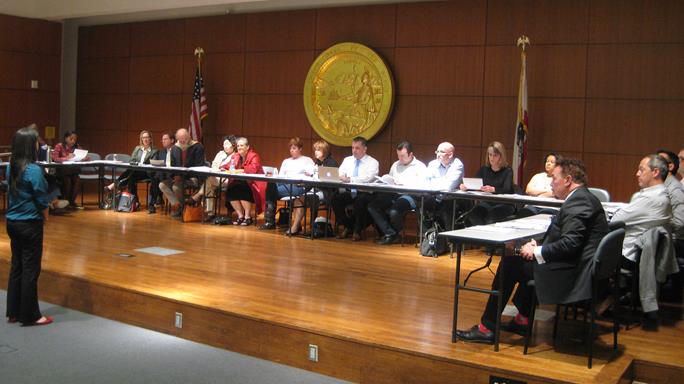
By Tim Redmond
JUNE 17, 2014 – Just three days before the June 3 election, tech mogul and mayoral ally Ron Conway handed $25,000 to the San Francisco Democratic Party. The next day, the chair of the party approved the expenditure of $11,674 for “membership communication calls.” That money went to a company in Texas that was making phone calls to voters encouraging opposition to Prop. B, the waterfront height limits.
Now some members of the Democratic County Central Committee are asking whether the chair should have spent that money without asking the entire panel for commission.
And supporters of Prop. B have filed a complaint with the Ethics Commission saying that Chair Mary Jung was involved in a misleading campaign that sought to confuse the voters.
It’s more than just a dispute over internal spending at the Democratic Party: Jung is a paid lobbyist for the real-estate industry, which opposed Prop. B, and critics say there’s an inherent conflict of interest in the head of the party unilaterally spending money from a downtown donor to help real-estate interests. It’s also a reminder that the progressives have lost control of the local Democratic Party.
“The power that comes with being the Chair does not mean that you can circumvent Bylaws and advocate and raise money for causes that you happen to also work for. There is a serious conflict of interest here,” DCCC members Kelly Dwyer, Hene Kelly, Eric Mar, David Campos, John Avalos, and Petra DeJesus noted in a June 16 letter to Jung.
Jung hasn’t returned my phone calls seeking comment.
The DCCC members also raise questions about the use of the money:
News reports indicate that the calls actually made with this significant donation were deliberately intended to mislead voters. People received calls from paid callers stating they were calling about the “No Wall on the Waterfront Campaign” and urging them to vote No on B. However, the No Wall on the Waterfront campaign is actually the official committee backing the Yes on B measure. These calls made in the name of the SF Democratic Party were simply deceptive and wrong and do harm to our reputation and to the integrity of the electoral process.
That reflects a complaint filed with the Ethics Commission by Geraldine Crowley, a former DCCC member. In her June 3 complaint, Crowley also argues that the last-minute phone calls were intentionally misleading.
Ethics has a terrible record in dealing with these sorts of complaints, but it’s going to come up at the DCCC: Jung’s critics want a special hearing on the subject at the next committee meeting, which will bring into focus the narrow split on the panel that allowed Jung to become chair.
Tenant activists have managed to craft a ballot measure that would tax real-estate speculators and make it less profitable to flip buildings in San Francisco. Not an easy task, since the state prevents local government from enacting a tax on income.
So the anti-speculation tax is moving forward as a real-estate transfer tax. It would apply to buildings of fewer than 30 units, and would tax the selling price of a building at 24 percent if it’s bought and sold within a year. That tax would fall to 14 percent by the fifth year, and would drop to zero after that.
It might very well slow down some of the speculation – and would bring in a lot of money to the city’s coffers, most of which ought to be used for affordable housing.
The hearing today on whether the loss of Sunday parking revenue requires an environmental impact report raised some critical questions, as many of these discussions do. If you take away the millions of dollars in Muni revenue, and thus in theory reduce Muni service and encourage driving, does that trigger the California Environmental Quality Act?
If that’s the case, then do you need CEQA review if you cut Muni fares (say, for seniors and youth) because that would reduce Muni revenue?
Is it legally okay for the Municipal Transportation Agency to ignore its own reports on Sunday meters (which show environmental benefits) and then say there are no environmental impacts?
Sup. David Campos and Sup. Scott Wiener had an interesting debate about whether the existing MTA structure (with all members appointed by the mayor) is helping Muni. Campos argued that the system is broken, and that allowing the mayor to essentially demand that his appointees roll back a good policy shows what’s wrong. Wiener said it’s not about governance: If the board appointed all of the members of the MTA, there would still be $2 billion in unfunded infrastructure needs.
A long list of speakers from environmental groups including Livable City and the League of Pissed Off Voters made that case, that as Livable City Director Tom Radulovich noted, “there are huge environmental impacts to getting rid of Sunday parking meters.”
MTA Director Ed Reiskin and city planning staff argued that under state law, the MTA can raise or lower fares without triggering CEQA. A couple of people spoke on the policy issue (they oppose Sunday meters). Then we got the wonders of San Francisco democracy.
One cab driver suggested that we just sell the Muni system to Google, since Google is taking over the rest of the world any way. Then a nudist stood up and complained that he can’t ride the buses naked (or sometimes he can, depending on the driver) and he needed some clarity on behalf of all of the city’s transit-riding nudists.
“I want you to get that in writing,” he said.
The appeal was rejected, 9-2, with only Sups. John Avalos and Eric Mar in favor.




